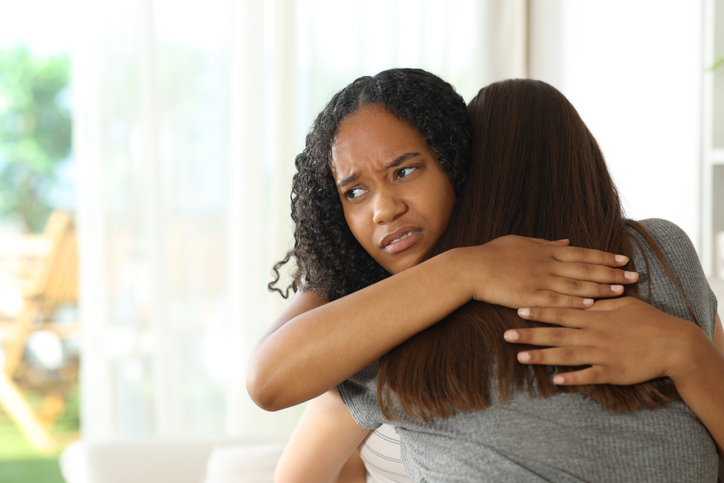8 Signs Your Friendship Might Be A Red Flag
8 Friendship Red Flags Worth Ending The Relationship Over
Share the post
Share this link via
Or copy link
Friendships are crucial to our well-being, but sometimes it can be hard to tell when they might be doing more harm than good. Spotting red flags in close friendships can be tricky because we often don’t want to believe that our besties might secretly harbor envy or cause us more stress than joy. After all, we rely on our friends for support, connection, and shared experiences. These bonds are essential for our mental and emotional health as well as our physical well-being.
While we’re often quick to identify red flags in romantic relationships—those behaviors that make us feel uneasy—it’s not always as easy to recognize when a friendship is going sour. In fact, we may overlook the signs because we’re so invested in maintaining those connections.
Related Stories
Here are eight signs that your friendship might be in trouble—and when it’s time to reconsider ending that toxic relationship.

Source: Prostock-Studio / Getty
1. They talk only about themselves.
Love MadameNoire? Get more! Join the MadameNoire Newsletter
We care about your data. See our privacy policy.
Ever find yourself stuck listening to your friend go on and on about their problems, their drama, their career struggles—while you can’t seem to get a word in? And when you finally share something about your life, they immediately shift the focus back to themselves? If it feels like you’re just a sounding board for their constant updates, that’s a red flag. Healthy friendships involve mutual listening and care, not just one person dominating the conversation.
Gabrielle Applebury, LMFT, a Los Angeles-based therapist, told SELF, that its important to decipher whether your friend is truly being dismissive of your thoughts and concerns, or if they have “poor communication skills” that maybe hindering them from being supportive when you need them. Try speaking to them directly about the issue before cutting ties.

Source: PeopleImages / Getty
2. You’re putting too much effort into the friendship.
Do you find yourself reaching out to your buddy more often than they contact you? Do you feel like you’re always the one initiating plans or making an effort to connect? When one person is more invested than the other, the relationship can quickly turn toxic. On the flip side, if a friend is constantly demanding your time but never makes an effort to reciprocate, that can feel like emotional exhaustion. Psychology Today notes, that true friendship is about balance—there should be mutual effort, not a one-sided dynamic where you’re always giving and they’re always taking.
This is another instance where it’s crucial to communicate your feelings with your friend about the state of your relationship. While it can be uncomfortable to tell a friend that they need to step up, it’s an important conversation to have. After all, friendships play a vital role in our emotional and physical well-being, and we don’t want to risk losing that support.
A 2023 study examining the link between social relationships and physical health shed light on just how significant friendships are to our overall well-being. The study found that the quality of our relationships has a direct impact on our health, affecting stress levels, heart rate, and blood pressure. It showed that positive relational experiences led to lower stress, better coping mechanisms, and improved physiological functioning. On the other hand, negative relational experiences were linked to higher stress levels and poorer health outcomes.
What’s even more interesting is that the variability in negative relational experiences (i.e., how much stress or tension fluctuates within a relationship) also played a significant role. Greater inconsistency in these negative experiences predicted worse stress management and higher blood pressure. In other words, not only is it the overall quality of the relationship that matters, but how emotionally unpredictable it is that can really take a toll on our well-being.
In short, when friendships become a source of consistent stress or emotional turbulence, it’s not just affecting our mood—it could also be affecting our health. So, it’s crucial to spot those red flags sooner than later. Put your health first.

Source: The Good Brigade / Getty
3. You’re relying on each other too much.
Friendships are meant to be a support system, not a crutch. If you and your friend have become so reliant on each other that you can’t function without them, the relationship may have crossed into codependency. It’s important for you both to have independence, according to author, Hope Kelaher.
“For a healthy friendship to work, both parties need to maintain their sense of self while also being able to grow together in the relationship,” Kelaher told SELF. “You should be able to have hobbies and interests of your own, for example, and support your friend’s independence, too.”

Source: AntonioGuillem / Getty
4. You’re walking on egg shells around them.
If your friend has constant mood swings, it might be time to reconsider the friendship. What once felt effortless and enjoyable now leaves you walking on eggshells or feeling drained if you say or do the wrong thing. If the dynamic becomes unpredictable and you no longer feel comfortable or at ease around them, that’s a major red flag. True friends should lift you up, not leave you feeling anxious or stressed.

Source: AntonioGuillem / Getty
5. You feel like you’re in competition all the time.
Do you celebrate your successes only to have your friend try to top them? If you share good news, and they respond with something like, “Oh, I did that even better last week,” or they constantly try to outdo your achievements, it may be a sign that trouble is on the horizon. If your friendship begins feeling like a weird game of tug-of-war, it’s a sign of unhealthy competition. True friends cheer each other on—without trying to one-up each other.

Source: Moyo Studio / Getty
6. They can’t apologize sincerely.
We all make mistakes, but a true friend knows how to take responsibility and offer a genuine apology when needed if they have overstepped a boundary or made you feel uncomfortable. If your friend constantly deflects blame, gives half-hearted apologies, or refuses to own up to their actions, that’s a major red flag. Accountability, support, and sincere remorse are the foundation of any healthy friendship.

Source: Mix and Match Studio / 500px / Getty
7. They constantly make jokes at your expense.
What once felt easy and fun now feels like you’re the butt of a never-ending joke. If your friend regularly makes jokes at your expense, leaving you feeling uncomfortable or belittled, it’s time to reassess the relationship. Healthy friendships should bring joy, not make you feel drained, anxious, or unappreciated.

Source: Prostock-Studio / Getty
8. They criticize or judge you frequently.
Honesty is key in any friendship, but there’s a fine line between constructive feedback and constant criticism. If your friend regularly judges you with a self-righteous attitude or makes you feel inadequate, it’s not a sign of care—it’s a sign of toxicity, according to Calm. True friends offer support and honesty with kindness, not harsh judgment disguised as “brutal truth.” Communicate how you feel and establish clear boundaries around their behavior. If they don’t respect those boundaries, it’s time to part ways.

Source: Deagreez / Getty
RELATED CONTENT: Britteny Floyd-Mayo Says Women Need To Level Up Their Friendships For Success










